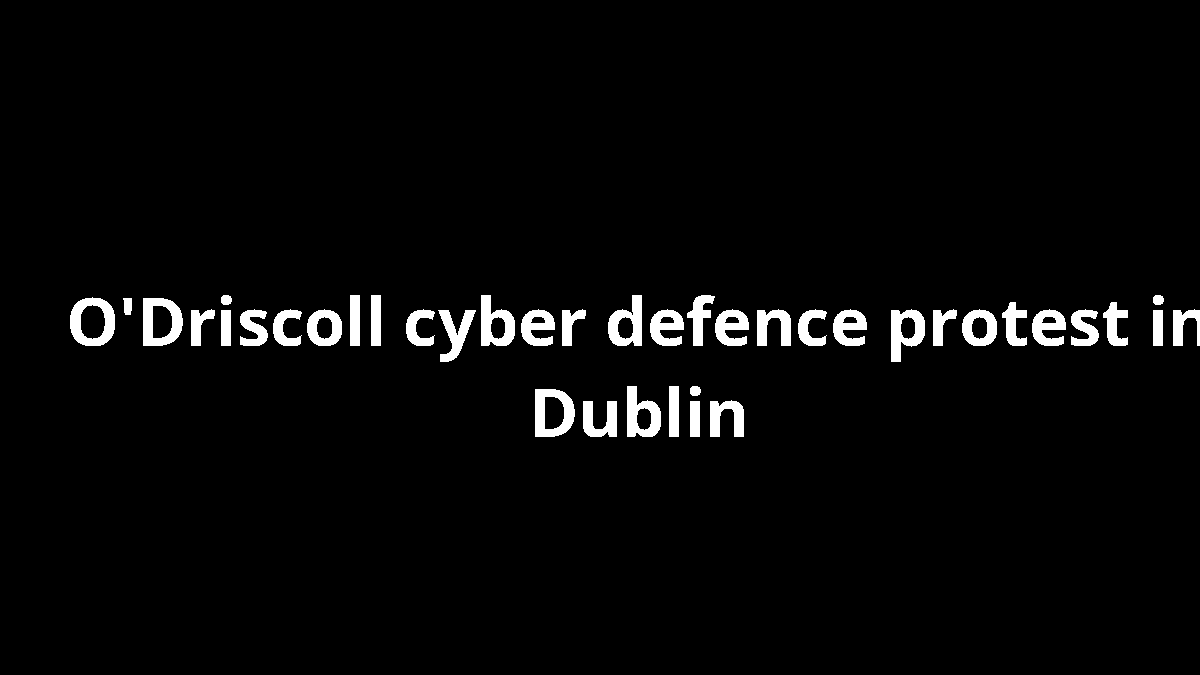O’Driscoll keynote interrupted by pro-Palestine protesters at Dublin cyber defence summit
At the Dublin cyber defence summit, O’Driscoll cyber defence protest interrupted the opening remarks. O’Driscoll cyber defence protest drew a cross-border crowd of tech professionals, policymakers, and rugby fans who had gathered to hear from Ireland’s most celebrated sporting figure. O’Driscoll cyber defence protest became a focal point for discussion long before the keynote could fully settle, with security staff quietly positioning themselves as chants rose from a section of the gallery. O’Driscoll cyber defence protest also highlighted how closely modern cyber discourse sits to geopolitics, a point underscored by attendees who juxtaposed the speaker’s rugby legacy with the forum’s security ties. In the first moments, O’Driscoll cyber defence protest was not simply a disruption; it was a signal that audiences expect a clear stance from event organizers on neutrality and openness. The tension surrounding the moment drew immediate media attention, and commentators compared the scene to high-stakes rugby chairing—where control of the field, much like the stage, can hinge on a split-second decision by stewards and speakers alike.
Origins of the protest and the audience reaction
The protest emerged from concerns about the forum’s ties to the Israel Defence Forces (IDF) and the broader implications for neutrality in cyber security dialogues. The O’Driscoll cyber defence protest did not arise from a single grievance; rather, it reflected a wider debate about how technology firms partner with security institutions. Observers noted the crowd’s demeanor ranged from earnest to pointed, with some participants insisting on a firm stance on ethics while others urged a return to constructive dialogue. The moment put the focus on the host company, Check Point Software Technologies, and its leadership’s past service in the IDF—a backdrop that has fuelled conversations in cyber circles about how governance, transparency, and accountability intersect with commercial events. For rugby fans watching through the lens of leadership under pressure, the scene mirrored how teams adjust on the fly when the environment shifts beneath them. See echoes of such adaptive thinking in how top clubs respond to tactical pivots on the field and in executive decision-making, which is discussed in broader rugby governance debates linked by World Rugby resources.
How the crowd interpreted the disruption
Many attendees framed the interruption as a necessary reminder that discourse in cyber security cannot be insulated from politics. The O’Driscoll cyber defence protest was described by some as a call for clearer boundaries between sponsorship, partnerships, and neutrality. Others argued that protests at industry events risk muting important conversations about resilience and governance. The tension underscored a core tension in rugby leadership as well: balancing tradition with the pressures of global, often controversial, change. This parallel is not perfect, but it resonates with how rugby powers at the international level manage external influences while preserving competitive integrity—an issue sometimes debated in rugby governance circles and covered by outlets like BBC Sport Rugby and World Rugby. The incident thus anchored a broader conversation about what responsible corporate event planning should look like in 2024 and beyond.
Irish rugby icon’s cyber defence speech halted over IDF links
The second segment of the day featured Brian O’Driscoll taking the stage with a prepared address on cyber resilience, governance, and strategy. However, the atmosphere had already shifted; the O’Driscoll cyber defence protest echoed in the room, coloring perceptions of the remarks to come. As the hall settled, the former rugby captain delivered with his characteristic calm, yet the crowd’s attention inevitably wandered toward the protests and the questions they raised about IDF connections and corporate ethics. The moment served as a reminder that branding and legacy in rugby do not exist in a vacuum; they intersect with broader global dialogues about technology, security, and rights to expression. Rugby audiences, in particular, are attuned to leadership narratives, and O’Driscoll’s handling of the moment was widely discussed in post-event analyses by rugby outlets and cyber policy commentators alike. Outbound rugby coverage from BBC Sport Rugby provided context on leadership under pressure, while World Rugby’s governance discussions offered a parallel lens on how institutions manage complex affiliations.
Security and speech: the balance of safety and free expression
Security staff moved efficiently to ensure that the event could continue with minimum disruption. While the crowd’s energy persisted, organisers signalled that the keynote would resume after a brief pause. The handling drew praise for calmness and clarity, with moderators urging continued dialogue while maintaining order. In rugby terms, it was akin to a captain steering the team through a controversial decision—keeping focus on the game plan while addressing external noise. The broader debate touched on whether corporate events should serve solely as neutral platforms or whether they have an obligation to reflect the ethical dimensions of their partners. Critics argued that neutrality is not a static condition but a process that requires transparent policies, independent oversight, and an ongoing public conversation—points increasingly discussed in rugby governance discussions and in cyber policy circles alike.
Check Point event in Dublin faces protests tied to IDF
The Check Point-hosted Dublin summit has long been positioned as a leading forum for cyber resilience, governance, and innovation. The O’Driscoll cyber defence protest highlighted a growing expectation that industry events address the ethical implications of corporate partnerships with security institutions. This section examines how the protest reframed conversations around sponsorship, speaking engagements, and the responsibilities of technology firms toward diverse stakeholders. The first-hand accounts from attendees and analysts alike suggested that the episode would influence future event design, including better briefing for speakers and clearer signaling about permissible conduct during Q&A sessions. Rugby fans naturally draw imperfect parallels to the sport’s own governance debates—how clubs navigate commercial partnerships with sponsors while keeping the integrity and spirit of the game intact. See how rugby reporting has historically tackled sponsor controversies through outlets like BBC Sport Rugby and analysis from World Rugby.
Corporate ties and public perception
Protesters argued that ties to IDF-linked entities risked undermining the forum’s credibility as a neutral platform for cyber defence discourse. Organisers emphasised that partnerships are part of a complex global ecosystem and insisted on ongoing dialogue about ethics and governance. For rugby communities watching from afar, this raised questions about how clubs and unions handle political pressures from sponsors and partners. The discussion mirrors ongoing debates about sponsorships in rugby, where a partner’s broader associations can affect fan sentiment and governance policies. As this issue evolves, stakeholders will look to established rugby governance precedents and cybersecurity ethics guidelines to shape future practices, including clearer disclosure standards and independent oversight mechanisms.
Lessons for event design and policy development
Event organizers are now considering more robust contingency plans, including clear statements of neutrality and explicit codes of conduct. The goal is to enable free expression without allowing disruption to overshadow essential dialogue on cyber resilience. In rugby circles, similar lessons have been applied when addressing sponsor influence and ethical standards in elite competitions, where transparency and accountability are central to public trust. The ongoing policy dialogue is increasingly supported by credible outlets such as BBC Sport Rugby for leadership commentary and World Rugby for governance frameworks, which offer useful benchmarks for balancing tradition with ethical considerations in a global sport context.
Protest disrupts Brian O’Driscoll’s cyber defence keynote
The final phase of the day returned to the scheduled keynote, with O’Driscoll maintaining composure and delivering his prepared remarks on cyber defence and resilience. The protest—while briefly disruptive—did not derail the core objective of the event: to advance understanding of cyber risks, governance, and strategy in an era of rapid technological change. As the room settled, discussions turned to the consequences of the interruption and the paths forward for industry dialogue. This moment has become a case study in how high-profile individuals handle pressure while preserving the integrity of a professional message. Rugby audiences often observe such moments with an eye toward leadership, mental resilience, and the ability to maintain focus amid noise. The coverage across reputable rugby outlets and cyber security analyses suggests a shared interest in how high-stakes situations are navigated, both on the field and in the boardroom. For ongoing rugby commentary on leadership under pressure, readers can reference BBC Sport Rugby and World Rugby’s governance discussions for broader context.
The path forward for Check Point and the security community
Organisers pledged a thorough review of how the incident was managed and promised improvements in future event protocols. The aim is to enable dynamic discussions while ensuring participants feel respected and safe. In rugby governance terms, it mirrors how federations review controversies after major tournaments, implement reforms, and communicate changes to fans and stakeholders. The broader security community is expected to continue debates about the ethics of partnerships, the boundaries of protest, and the balance between free expression and professional decorum. The episode has already sparked concrete conversations about governance, transparency, and accountability that will shape how cyber defence events are marketed and conducted in the months ahead.
For readers seeking additional rugby perspectives on leadership, strategy, and governance, the content above is complemented by insightful reporting from BBC Sport Rugby and in-depth policy discussions at World Rugby. As the rugby world continues to evolve in parallel with cyber security debates, the O’Driscoll cyber defence protest episode serves as a reminder that sport, technology, and geopolitics increasingly intersect in public discourse. The key takeaway is not simply what happened, but how the industry learns, adapts, and maintains a commitment to open dialogue while upholding the highest standards of governance and ethics.


